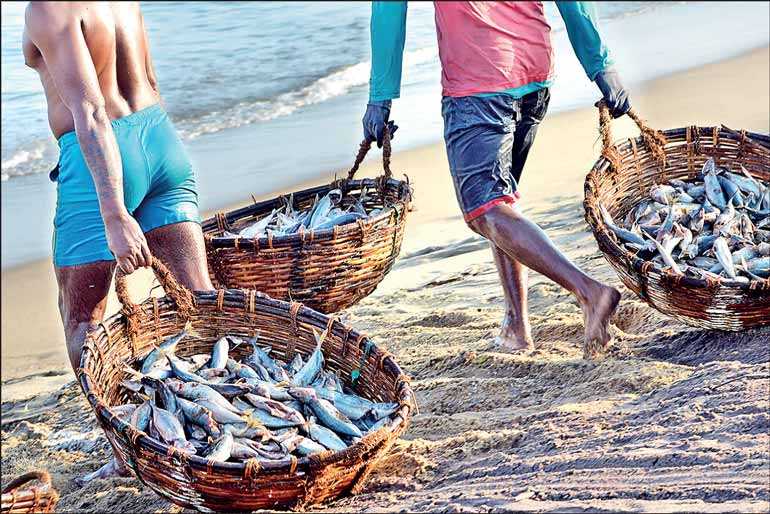Monday Feb 16, 2026
Monday Feb 16, 2026
Wednesday, 21 April 2021 00:00 - - {{hitsCtrl.values.hits}}

Sri Lanka’s fishery sector needs rapid, revolutionary and accelerated development – Pic by Shehan Gunasekara
 Current and future prosperity of Sri Lanka is intrinsically linked to its coastal, marine and mineral assets or neglected ocean resources. Fisheries and tourism can be two main pillars of its gross domestic product GDP economy and source of employment.
Current and future prosperity of Sri Lanka is intrinsically linked to its coastal, marine and mineral assets or neglected ocean resources. Fisheries and tourism can be two main pillars of its gross domestic product GDP economy and source of employment.
Ocean resource development connected fisheries, nautical tourism, boat/ship building, ship repairs, mineral sand mining, aquaponics/hydroponics should be considered by our ministers, planers, public officials connected to ministries, as well as private sector connected to fisheries, tourism if they are capable of thinking out of box.
We still follow stories related by planners in the 1940s when we were a developed economy compared to the rest of South Asia managed by the British. All countries around us since 1948 have turned a new leaf and are passing us or have passed us. Our governments and planners are still reading pages of the old book.
Sri Lanka’s GDP Global Rank was 57 in 2020, China 2, India 6, Indonesia 16, Philippines 34, Pakistan 39, Vietnam 40, Bangladesh 44. By 2040 India is posed to be most populated country overtaking China and GDP Global Rank 3, China hitting position 1, Indonesia 8, Pakistan 23, Vietnam 24, Bangladesh 28, No prediction available for Sri Lanka. Where we will be by 2040?
There are many related agencies connected to ocean resource domestic product such as the National Aquaculture Development Authority, Department of Coast Conservation, Costal Resource Management, Sri Lanka Coast Conservation Management, Marine Environment Protection Authority, Sri Lanka Fishery Harbour Corporation, Sri Lanka Ports Authority, Tourism Development Authority, Merchant Shipping Secretariat, Ceynor, Mineral Sands Corporation, Department of Wild Life, Navy, Coast Guard, Sri Lanka Customs, Ministry of Fisheries, Ministry of Defense, Ministry of Trade, Export Development Board, Ministry connected to Petroleum Resource Development (now asleep), Ministry of Agriculture, Board of Investment, private sector boat/yacht builders, yacht/leisure boat operators, ship repairers to name some.
They are administered under many ministries where right hand does not know what left hand is up to. Have all these departments ever met as a team or with private sector operators to discuss development of domestic product as a part of economy?
This may be the only island nation surrounded by ocean that imports low quality canned fish controlled by a canned fish importers mafia that imports canned fish to feed so called malnourished citizens. The same canned fish importers mafia incited Buddhist clergy to protest when a Prime Minster in the 1980s wanted to introduce fish spawn into inland tanks and reservoirs. The project was abandoned. Foreign fishing boats/multi-day craft/trawlers fish in our water and we sleep over it with many ministers, Navy, Coast Guard paid by public as they have no capacity to think of country first. Fishery sector needs rapid, revolutionary and accelerated development
The private sector needs to be encouraged to deploy ‘mother vessels’ around the island to help fishermen to store their catch in cold rooms or blast frozen to meet export requirements and also assist with first aid, fuel, water, etc. during the days they are at sea. There are massive sea water tank vessels operated by Japan and other sashimi consuming countries that help sashimi fish harvesters to store their fish fresh for many days in sea water till they dock
Sri Lanka must develop cold room services in every fishery harbour with facilities to store fish at -60c for export market or blast frozen.
Establish training schools for fishing folks in modern methods of fishing by use of electronic equipment.
Enhance involvement of an ocean university in fishery sector education and boat building.
Encourage multi day fishing vessel builders to fit sea water ice generation plants or deep freezers by granting soft loans to buyers instead of using 0c ice and Styrofoam boxes to store fish while at sea.
Establish dedicated subsidised insurance scheme based on annual fitness check of boats as done for road vehicles for fishermen to cover their families and boats in the event of disaster or sickness.
Promote and provide low cost loans for deep sea fish cultivation farms.
Development of fish processing and canning plants.
Encourage processing fish waste into fish food and fertiliser.
Enhance cold chain logistics to transport fish into hinterland for local consumption at affordable prices.
Expand Fisheries Corporation and eliminate or minimise corruption and middlemen.
Establish laboratories to periodically check fish quality/toxins and monitor harvest.
Sri Lanka is yet to develop organic vegetable growing technology using the principle of aquaponics/hydroponic. Aquaponics involves growing fish and plants together within the same environment, which is considered to be a sustainable process. Hydroponics is a gardening method that allows plants to be grown without the use of soil. A hybrid between aquaculture and hydroponics, using organic fish waste to fertilise vegetable growth. Aquaponics works on a circular system. Water from fish tanks and lagoons is filtered by the growing medium and plants as they grow. The water is then returned to tanks/lagoons cleaner than before. Aquaponics/hydroponics is commonly used in many countries alongside river basins/lagoons as only a small percentage of water is consumed using zero artificial fertiliser and pesticides compared to traditional soil based farming
Nautical tourism is neglected in this island nation. Nautical tourism can be developed using the 20 fishery harbours, other protected lagoons and river mouths around Sri Lanka by promoting mini marinas.
Speedy implementation of ‘Harbour Village Concept’ should be encouraged by the Urban Development Authority and private sector where land around fishery harbours and other lagoons can be developed for tourism related services, real estates and coastal urban development.
Grow/house boats can be encouraged for individuals to own their boats and live in them with facility to anchor in mini marinas right round the island with services for discharge of sewage, kitchen waste and obtain services, supplies.
Bangladesh, one of the fastest growing nations in our surroundings has a 22-day ban on fishing in inland waters, rivers and reservoirs during fish spawning season. I have been on restaurant river boats in Bangladesh where they harvest river fish 40–80 Kg in weight. Female fish are put back and only male fish are cooked on board. Do any of our fishermen put female fish back in to sea or inland water? Thirty years ago there were many fish in lagoons, rivers, tanks in paradise. Where are they now? Fish cannot breed or grow in inland water due to high contamination of water by poison washed in to them by excessive use of chemical fertiliser and weedicides. Trout fishing was very popular in N’Eliya, now unheard of. Female lobsters were not harvested by fisherman of the past. Now who cares? Female lobsters with eggs are found in plenty where lobsters are available for purchase. There are no fishing bans in lakes and tanks during spawning periods in this country. If a ban is introduced our empty vessel politicians will organise protest marches as they have no capacity to think beyond their nose that fish too need a peaceful environment to breed. Harvesting and development of mineral sands based industries should be a long term plan instead of exporting mineral sand without processing and importing processed mineral sand such as zircon, titanium for use in industry.
These are just a few to note for action by our planners who have neglected ocean resources of the country since independence. Public is yet to hear plans by our legislators on ocean resource development. Our legislators will keep on wasting time on personalities other than voicing opinion on development at least for Sri Lanka to be GDP rank 30 by 2040. Mr. President/Prime Minister: Food for thought if you can muster the governing party politicians to think country first.